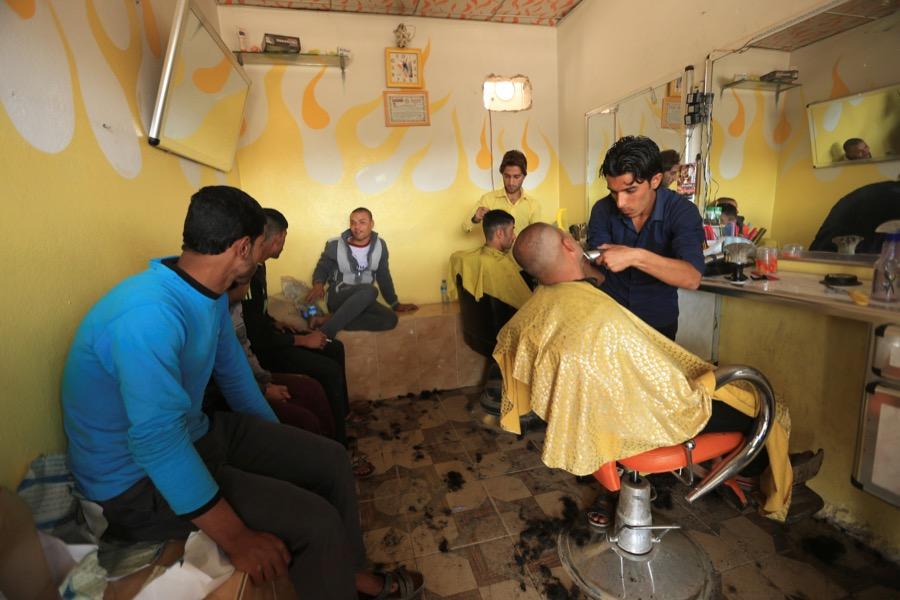ISIS jailed and beat up this Iraqi barber for giving the wrong haircut
Iraqi men at a barber shop in the Intisar district of Mosul, Iraq, on Nov. 14. The barber interviewed for this story is not one of them.
When the Islamic State came to Mosul, the city’s residents were forced to change a lot of things about the way they lived, whom they spoke to, how they dressed, and even how they cut their hair.
That was bad news for barbers like Muhammad.
“Business was bad. People started to cut their hair at home. Men had their hair cut by their wives,” says Muhammad, who lived in the Samah neighborhood in the east of the city before fleeing one week ago. He is now living in a camp for displaced people in Khazir, east of Mosul. (He is not one of the men photographed above, and his last name is withheld for his safety.)
ISIS forbids “Western-style” haircuts and forces men to grow their beards. In fact, beyond hair, anyone showing what ISIS deems a sign of Western influence on their lifestyle is walking a dangerous line.
Before the group swept into the city in June 2014, Moslawis — as Mosul residents are known — weren’t afraid to experiment with their hairdos.
“Some people used to write their names in the back of their heads, some people had really sculpted beards,” Muhammad says.
But when the only choice of haircut is “a little bit shorter, nothing flashy,” people just didn’t need the barber.
Of all the horrors visited upon those living under ISIS, these restrictions on grooming may seem like a banal irritation. But for Muhammad — a man in his mid-twenties who now sports a delicately manicured goatee and a quiff — they put his life in danger.
“I was taken by ISIS because I styled someone’s hair differently,” says Muhammad, pushing his bangs up to demonstrate how he did it.
What happened next is just one example of the many indignities faced by those who living in the group's self-proclaimed caliphate, where every aspect of life is monitored and controlled.
A few days after the styling, an ISIS fighter saw the customer on the street and asked him who cut his hair. They brought him to Muhammad’s shop and demanded answers. The fighters shaved off all of Muhammad’s hair and took him to an ISIS judge.
“He asked me what my crime was,” Muhammad says. “I said shaving.”
Muhammad was sent to jail, along with the customer whose hair he cut.
“They don’t tell you when you would be released; [the judge] just throws you in prison,” he says. “At night they’d come and take you and you’d be beaten and lashed.”
Muhammad was detained for a week before being let go. And he wasn’t the only barber to receive punishment for styling hair the wrong way.
In September, Iraqi News reported that 14 barbers were publicly flogged for “violating the ideological standards of the organization.”
For many fleeing Mosul, the chance to get a decent haircut and a shave after two years of growing it long is a welcome treat in a difficult time. The demand for a good haircut in camps holding former Mosul residents is so high that barbers have flocked from nearby Erbil to help out.
Khazir camp, where Muhammad now finds himself after leaving the city a week ago, is slowly filling up.
An offensive to recapture the ISIS stronghold of Mosul began a month ago, with the Iraqi army and Kurdish peshmerga leading the fight. Around 100 US troops are fighting alongside those forces on the front lines, and more than 5,000 US personnel are in Iraq in a supporting role.
This coalition made fast progress recapturing villages and towns surrounding Mosul, but as the battle creeps closer into the city itself, they are facing fierce urban combat from ISIS fighters. The fighting in more populated areas means more people are escaping the city and coming to camps like Khazir.
More than 50,000 people have fled their homes due to fighting in and around Mosul since Oct. 17, according to the United Nations. Around 15,000 of them are living in the Khazir camp, a maze of tents and chaotic movement where people line up throughout the day to receive water and food.
